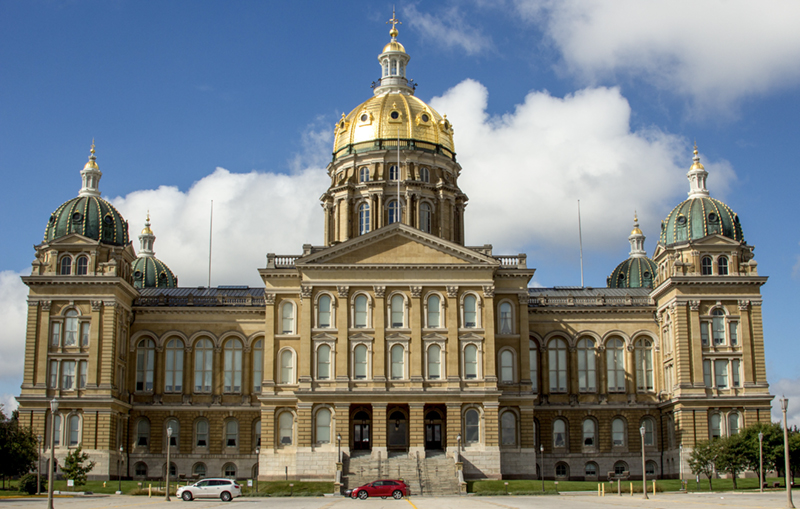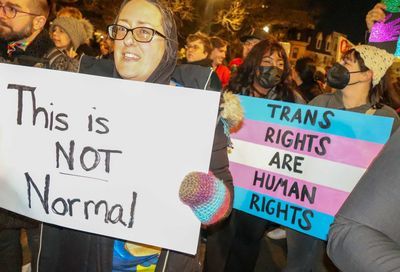Judge Blocks Georgia from Enforcing Ban on Hormone Treatments
A federal judge finds trans plaintiffs and their parents are "likely" to prove that the ban is unconstitutional.

A federal judge temporarily blocked the state of Georgia from attempting to enforce a ban on gender-affirming treatments for minors suffering from gender dysphoria.
In an 83-page order issued Sunday, U.S. District Judge Sarah Geraghty, of the Northern District of Georgia, said the law’s provision prohibiting medical professionals from prescribing hormone therapy for such patients was “substantially likely to violate the Equal Protection Clause,” reports CNN.
Under the law, which went into effect on July 1, medical providers are prohibited from recommending gender-affirming care to any minor, including puberty blockers, hormone therapy, or gender confirmation surgery — the latter of which is rarely performed on minors.
A group of four transgender youth — including two who are currently on puberty blockers — and their parents, and an advocacy group that works to connect families of transgender children to local doctors who provide gender-affirming treatments, sued just before the law took effect, claiming that the ban effectively denies transgender minors essential medical care.
While the prohibition on surgery was not challenged, thereby remaining in effect, the prohibition on hormone-related treatments was.
Opponents of the law, including the case’s main plaintiffs, argued that it infringes on parents’ rights to make medical decisions for their children’s health and blocks them from what most experts consider the appropriate medical treatment for youth suffering from gender dysphoria.
Geraghty sided with the plaintiffs, finding that they would likely succeed in challenging the law’s constitutionality.
In issuing her injunction, she blocked state officials from barring any minors from accessing hormone-related treatments — as compared to the state, which argued that any injunction, if granted, should only apply to the four plaintiffs and their families.
But Geraghty found that an injunction was needed to prevent the plaintiffs — and other similarly situated youth — from suffering “irreparable harm.”
“Considering the record evidence as discussed at length in previous sections of this order, the Court determines that the imminent risks of irreparable harm to Plaintiffs flowing from the ban — including risks of depression, anxiety, disordered eating, self-harm, and suicidal ideation — outweigh any harm the State will experience from the injunction,” she wrote.
The injunction will remain in place “pending trial, or until further order of the Court.”
With it in place, minors in the state will be allowed to access puberty blockers or hormone replacement therapy, so long as their parents consent and their doctors believe it to be medically necessary — which will depend on individual circumstances.
Lawyers for the plaintiffs — a group that includes representatives of the Human Rights Campaign Foundation, the Southern Poverty Law Center, the American Civil Liberties Union of Georgia, and the law firm O’Melveny & Myers LLP — celebrated the injunction.
“This decision is an incredible victory for Georgia families,” the plaintiffs’ attorneys said in a joint statement. “This law unapologetically targets transgender minors and denies them essential health care. The ruling restores parents’ rights to make medical decisions that are in their child’s best interest, including hormone therapy for their transgender children when needed for them to thrive and be healthy.”
Georgia is one of 22 states nationwide that has sought to prevent doctors from prescribing gender-affirming care to minors.
Many of those states, which have Republican-led legislatures, have pursued bans on transgender health care treatments — and measures restricting LGBTQ visibility more broadly — to appeal to GOP voters and swing voters. They argue that the prohibitions are needed to prevent youth from pursuing irreversible medical procedures that they will later grow to regret.
Support Metro Weekly’s Journalism
These are challenging times for news organizations. And yet it’s crucial we stay active and provide vital resources and information to both our local readers and the world. So won’t you please take a moment and consider supporting Metro Weekly with a membership? For as little as $5 a month, you can help ensure Metro Weekly magazine and MetroWeekly.com remain free, viable resources as we provide the best, most diverse, culturally-resonant LGBTQ coverage in both the D.C. region and around the world. Memberships come with exclusive perks and discounts, your own personal digital delivery of each week’s magazine (and an archive), access to our Member's Lounge when it launches this fall, and exclusive members-only items like Metro Weekly Membership Mugs and Tote Bags! Check out all our membership levels here and please join us today!
























You must be logged in to post a comment.